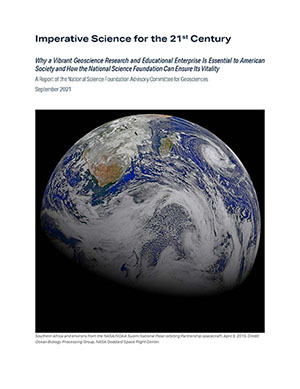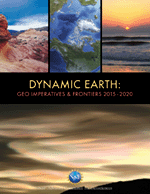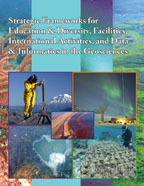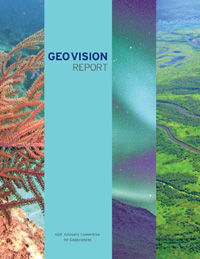AC GEO Reports
Imperative Science for the 21st Century (2021)
Geoscience research supports the development of sound public policy in the energy, agricultural, water resource, land use, air quality, and infrastructure sectors. While some of this support can â and does â come from the private sector, many facets of geoscience research fall outside the scope of industrial activity and interest. In its support of U.S. scientists to participate in international collaborations, NSF Geoscience also accelerates global scientific research; the growth in scientific productivity over the past two decades in many developed nations is almost entirely accounted for by international collaborations.

Imperative Science for the 21st Century
September 2021 (Adobe Acrobat file)
Dynamic Earth: GEO Imperatives & Frontiers 2015-2020 (2014)
This document represents a collective effort to articulate GEO-wide priorities and focus areas. Input and feedback was sought and received from many sources including GEO program officers, professional society conferences, advisory committees, decadal surveys, town hall meetings, working group collaborations between AC GEO members and GEO staff, and the research community. NSF-level strategic goals, administration-level priorities and principles, and the perspectives of the four GEO divisions are also captured in this "living" document. The goal of this document is both to lay out a near-term plan for geosciences research supported by NSF and to highlight the importance and breadth of the scientific enterprise funded by GEO.
Dynamic Earth: GEO Imperatives & Frontiers 2015-2020
December 2014 (Adobe Acrobat file, 48 MB)
Strategic Framework for Education and Diversity,
Facilities, International Activities, and Data and Informatics in
the Geosciences (2012)
After issuing GEO Vision in 2009, AC GEO recognized that an examination of the underlying and cross-cutting foundational areas for the geosciences was necessary in meeting the research challenges and related recommendations. In concert with the NSF Directorate for Geosciences, AC GEO formed four subcommittees in order to strategize and more carefully examine the underlying themes that cut across and support the geosciences. This report outlines strategic plans in the four areas--education and diversity, facilities, international activities, and data and informatics.
Strategic
Framework for Education and Diversity,
Facilities, International Activities, and Data and Informatics in
the Geosciences
April 2012 (Adobe Acrobat file)
GEO Vision (2009)
In 1999, the NSF Advisory Committee for Geosciences (AC-GEO) published NSF Geosciences Beyond 2000. A long-range strategy document for the GEO Directorate, this report was developed through collaborative efforts among leading geoscientists and researchers in government, academia, and business. By 2005, the AC-GEO recognized that the report had served the Directorate well, but that in the intervening years, new opportunities in science and emerging technological developments suggested that the plan should be revisited. The AC-GEO chartered the GEO Vision Working Group to develop an updated plan. This report is the result of that effort.
GEO
Vision, October 2009 (Adobe Acrobat File, 2 MB)
To request hardcopies, please send an e-mail to geowebmaster@nsf.gov.



